Proven efficacy in both laboratory studies and real-world settings
ActivePure® is THE technology proven to reduce pathogens in the air and on surfaces in real-time.
Devices with ActivePure Technology have been proven against a wide-range of pathogens
Aspergillus niger (endospore; Toxic Black surrogate)
H1N1 (Swine Flu; Influenza A virus)
Mycobacterium tuberculosis (TB)
Aspergillus versicolor (fungus)
H5N8 (Bird Flu; Influenza A virus)
Phi-X174 (DNA bacteriophage virus)
Bacillus globigii (bacterial endospore; Anthrax surrogate)
Legionella pneumophila (Gram- bacteria)
Respiratory syncytial virus (RSV)
Botrytis cinerea (fungus)
Listeria monocytogenes (Gram+ bacteria)
Salmonella enterica (Gram- bacteria)
Candida auris (fungus)
Methicillin-Resistant Staphylococcus aureus (MRSA; Gram+ bacteria)
SARS-CoV-2
Clostridioides difficile (C. diff; endospore)
Monkeypox virus (MPXV)
Sclerotinia sclerotiorum (fungus)
Erwinia herbicola (Gram- bacteria)
MS2 (RNA bacteriophage virus)
Staphylococcus aureus (Gram+ bacteria)
Escherichia coli (E. coli; Gram- bacteria)
Murine Norovirus (virus)
Staphylococcus epidermis (Gram+ bacteria)
Clostridioides difficile (C. diff; endospore)
Erwinia herbicola (Gram- bacteria)
H1N1 (Swine Flu; Influenza A virus)
H5N8 (Bird Flu; Influenza A virus)
Listeria monocytogenes (Gram+ bacteria)
Methicillin-Resistant Staphylococcus aureus (MRSA; Gram+ bacteria)
Monkeypox virus (MPXV)
MS2 (RNA bacteriophage virus)
Murine Norovirus (virus)
Mycobacterium tuberculosis (TB)
Respiratory syncytial virus (RSV)
Hide
Testing done on multiple devices with ActivePure Technology, excluding the ActivePure Medical Guardian, at multiple 3rd party labs. Please contact us for specific testing results and/or additional testing information.
ActivePure® Technology is scientifically proven to be ≥ 99.9% effective against:
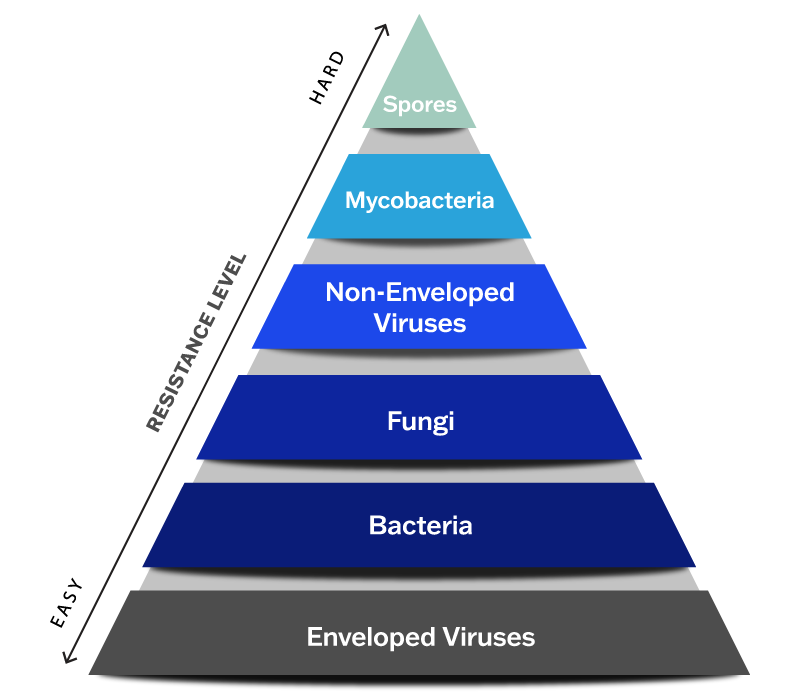
To learn more about the hierarchy of pathogens, review Dr. William Rutala’s Overview of Current Disinfection Hierarchy Models.
Spores
Bacillus Globigii (Spore)
(Same category as Clostridioides Difficile)
Mycobacteria
Testing completed against harder pathogens
(Mycobacterium tuberculosis)
Non-Enveloped Viruses
MS2 & Phi-X 174 (Non-Enveloped Viruses)
(Same category as Norovirus, Polio & HAV [Hepatitis A Virus])
Fungi
Aspergillus Niger (Fungi)
(Same category as Candida Auris & Trichophyten)
Bacteria
Staphylococcus Epidermis & Erwinia Herbicola (Bacteria) (Same category as MRSA, VRE & Acinetobacter)
Enveloped Viruses
Testing completed against harder pathogens
(Category of H1N1 [Swine Flu] H5N8 [Bird Flu] & SARS-CoV-2)
Spores
Bacillus Globigii (Spore)
(Same category as Clostridiodes Difficile)
Mycobacteria
Testing completed against harder pathogens
(Category of Mycobacterium Tuberculosis)
Non-Enveloped Viruses
MS2 & Phi-X 174 (Non-Enveloped Viruses)
(Same category as Norovirus, Polio & HAV [Hepatitis A Virus])
Fungi
Aspergillus Niger (Fungi)
(Same category as Candida Auris & Trichophyten)
Bacteria
Staphylococcus Epidermis & Erwinia Herbicola (Bacteria)
(Same category as MRSA, VRE & Acinetobacter)
Enveloped Viruses
Testing completed against harder pathogens
(Category of H1N1 [Swine Flu] H5N8 [Bird Flu] & SARS-CoV-2)

To learn more about the hierarchy of pathogens, review Dr. William Rutala’s Overview of Current Disinfection Hierarchy Models.
Spores
Bacillus Globigii (Spore)
(Same category as Clostridioides Difficile)
Mycobacteria
Testing completed against harder pathogens
(Mycobacterium tuberculosis)
Non-Enveloped Viruses
MS2 & Phi-X 174 (Non-Enveloped Viruses)
(Same category as Norovirus, Polio & HAV [Hepatitis A Virus])
Fungi
Aspergillus Niger (Fungi)
(Same category as Candida Auris & Trichophyten)
Bacteria
Staphylococcus Epidermis & Erwinia Herbicola (Bacteria)
(Same category as MRSA, VRE & Acinetobacter)
Enveloped Viruses
Testing completed against harder pathogens
(Category of H1N1 [Swine Flu] H5N8 [Bird Flu] & SARS-CoV-2)
Spores
Bacillus Globigii (Spore)
(Same category as Clostridiodes Difficile)
Mycobacteria
Testing completed against harder pathogens
(Category of Mycobacterium Tuberculosis)
Non-Enveloped Viruses
MS2 & Phi-X 174 (Non-Enveloped Viruses)
(Same category as Norovirus, Polio & HAV [Hepatitis A Virus])
Fungi
Aspergillus Niger (Fungi)
(Same category as Candida Auris & Trichophyten)
Bacteria
Staphylococcus Epidermis & Erwinia Herbicola (Bacteria)
(Same category as MRSA, VRE & Acinetobacter)
Enveloped Viruses
Testing completed against harder pathogens
(Category of H1N1 [Swine Flu] H5N8 [Bird Flu] & SARS-CoV-2)
ActivePure Medical Guardian testing for FDA Class II Clearance
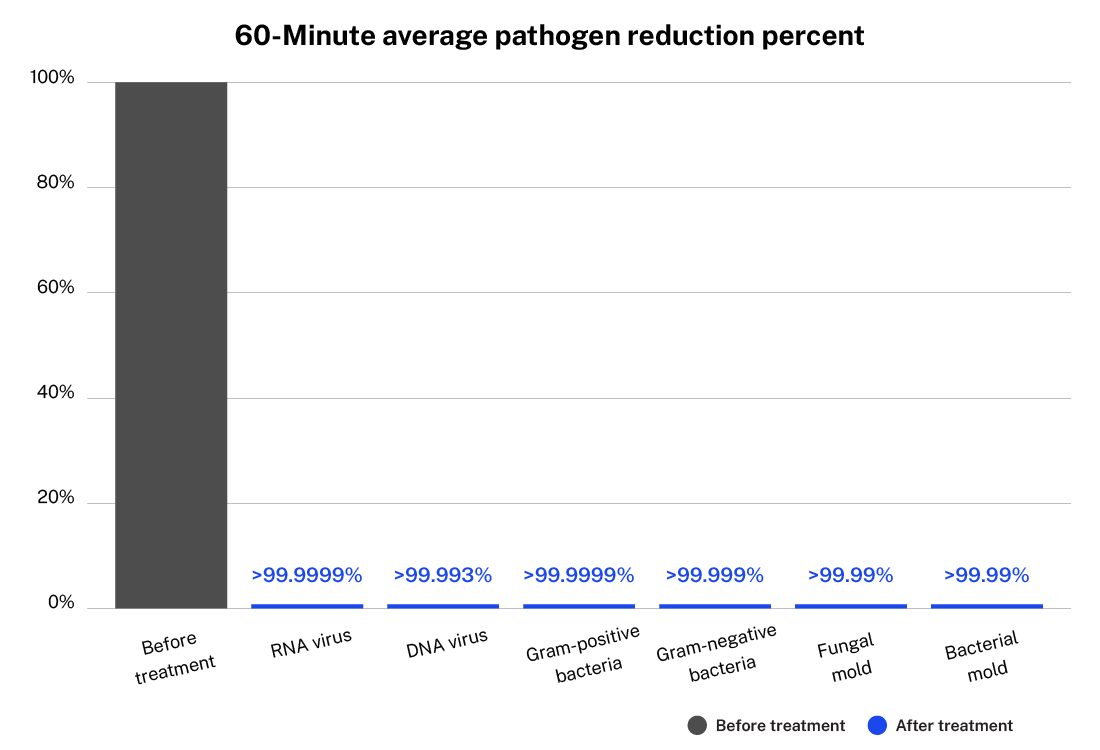
60-Minute average pathogen reduction percent
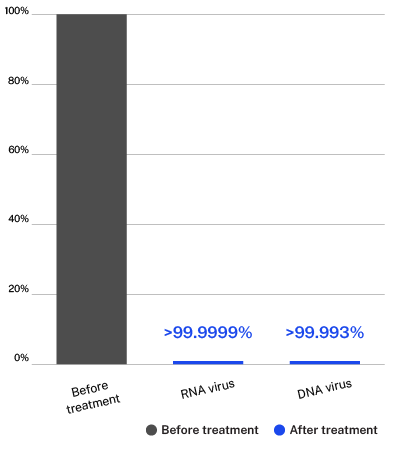
Testing done on the ActivePure Medical Guardian at Aerosol Research and Engineering Laboratories, a 3rd-party unaffiliated laboratory with no connection to ActivePure or its affiliates. RNA Virus: MS2 Bacteriophage. DNA Virus: Phi-X174 Bacteriophage.
60-Minute average pathogen reduction percent
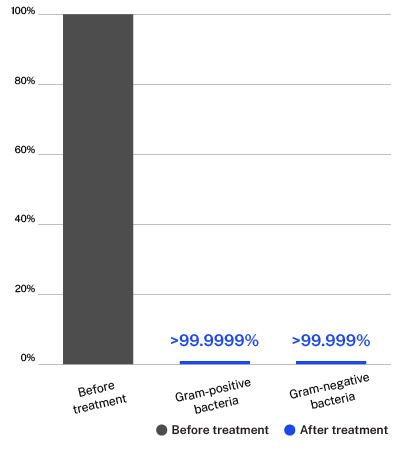
Testing done on the ActivePure Medical Guardian at Aerosol Research and Engineering Laboratories, a 3rd-party unaffiliated laboratory with no connection to ActivePure or its affiliates. Gram-positive Bacteria: Staphylococcus Epidermidis. Gram-negative Bacteria: Erwinia Herbicola.
60-Minute average pathogen reduction percent
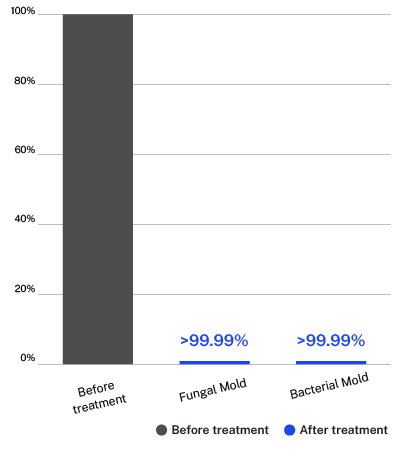
Testing done on the ActivePure Medical Guardian at Aerosol Research and Engineering Laboratories, a 3rd-party unaffiliated laboratory with no connection to ActivePure or its affiliates. Fungal Mold: Apergillus Niger. Bacterial Mold: Bacillus Globigii.
Testing done on the ActivePure Medical Guardian at Aerosol Research and Engineering Laboratories, a 3rd-party unaffiliated laboratory with no connection to ActivePure or its affiliates. RNA Virus: MS2 Bacteriophage. DNA Virus: Phi-X174 Bacteriophage. Gram-positive Bacteria: Staphylococcus epidermidis. Gram-negative Bacteria: Erwinia herbicola. Fungal Mold: Aspergillus niger. Bacterial Mold: Bacillus globigii.
Peer-reviewed science
ActivePure is committed to the highest scientific standards, with multiple published peer-reviewed studies and more in progress. The first was a study published in the American Journal of Infection Control (AJIC) on healthcare-associated infection (HAI) reduction. This study is on the pioneering edge of demonstrating that continuous decontamination can reduce surface, floor, and air contaminants and thereby reduce the acquisitions of HAIs. A summary of those results is available here.
The second study was also published by AJIC and focused on ActivePure’s efficacy against SARS-CoV-2, respiratory syncytial virus (RSV), and monkeypox virus. The results of the study highlight ActivePure’s potential as a valuable tool for improving indoor air quality and infection control. A summary of those results is available here.
Our third published peer-reviewed study was published in PLOS ONE. It examined the impact of ActivePure Technology on lab mice using the same concentrations of ActivePure proven effective against viral, bacterial, and fungal pathogens. This study showed that there were no statistically significant differences between the test group and control group due to exposure to ActivePure. A summary of those results is available here.